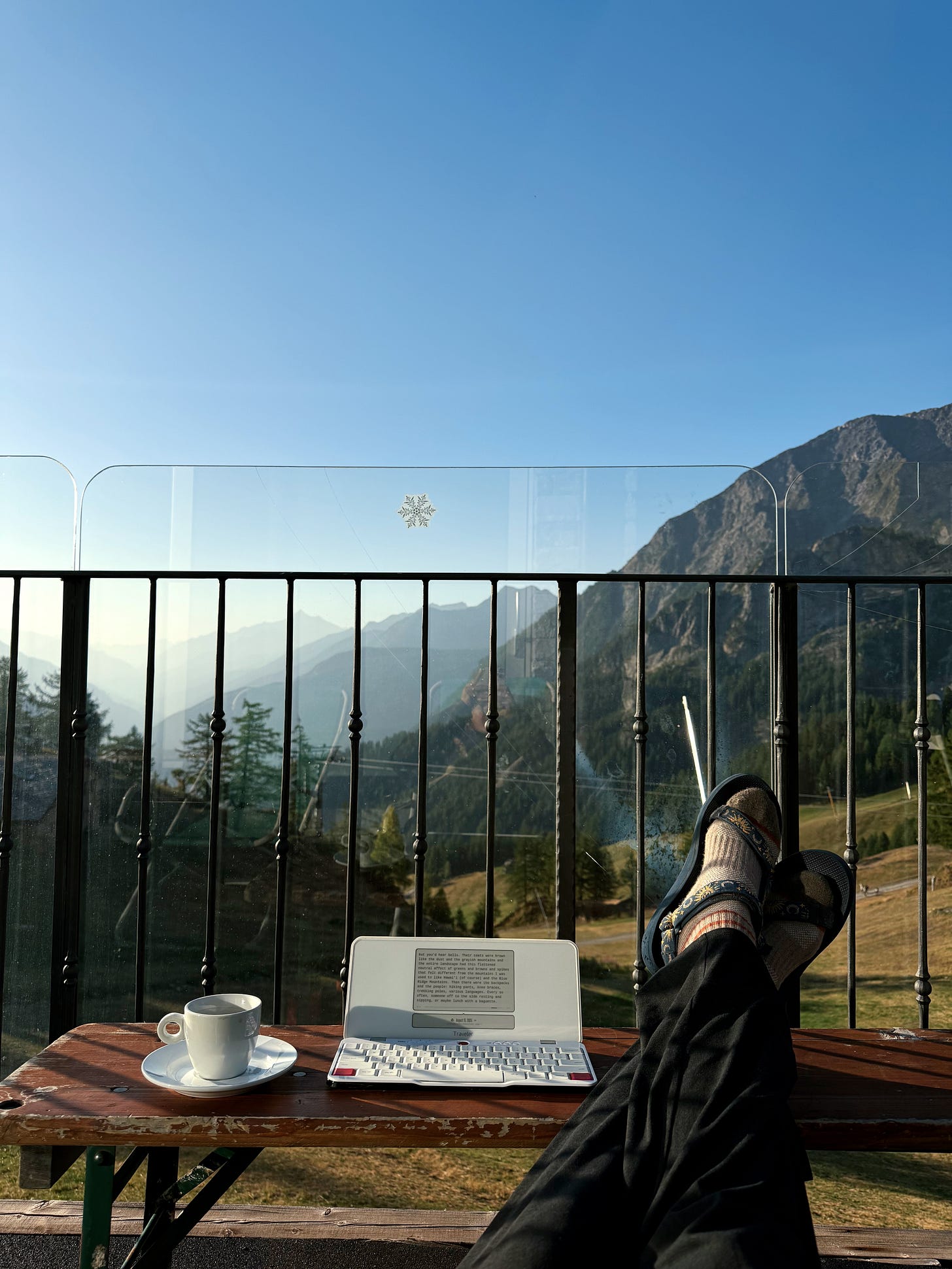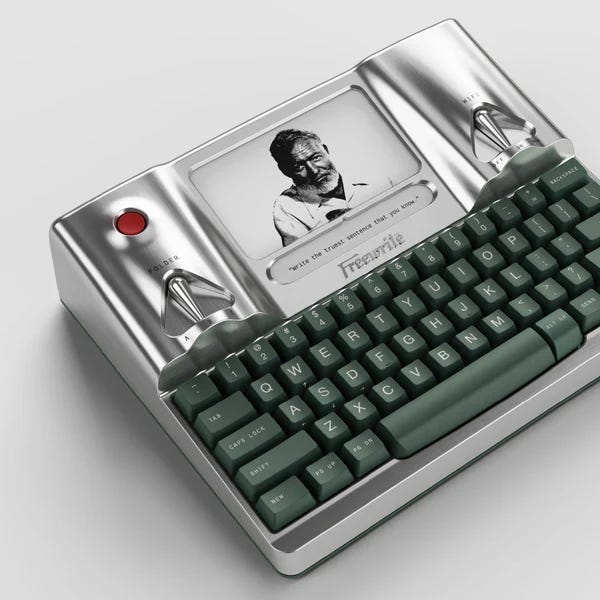The Freewrite promises to transform your writing life. But is this author gadget actually worth it?
Boost your word count, eliminate distractions, join the community, maintain your streak? My honest review of this buzzy writing accessory as an author + product reviewer.
I’m no stranger to writing and productivity tech. If a gadget promises to make me more efficient, I’ll likely try it out—perpetually seeking the system that will give me complete, unfettered control over my time.1 Everyone has a different system for getting over the shockingly difficult roadblock of getting words down.2 It seems simple and yet is not.
If you’re an author or active writer, you might have seen the Freewrite gadget before, a glitzy tool inspired by typing systems like the Alphasmart that were formerly used to teach typing in classrooms. (Ally Carter, author of the bestselling Gallagher Girls series, swears by drafting on the Alpha.)3
I produce an obscene amount of words per day, especially when trying not to, so the Freewrite doth intrigue.
After a long process of waffling before eventually splurging, I’ve been using the Freewrite Traveler since April. As a book reviewer, freelance journalist, and author, the device targets a lot of pain points for my daily workflow—but has plenty of pros and cons. It’s definitely not for everyone.
What Exactly Is the Freewrite?
Produced by Astrohaus, the Freewrite is a smart typewriter. It’s a simple word processor that I describe to strangers as a “Kindle but for writing.” Including just a keyboard and e-ink screen, the device promises to help writers boost their word count, transform their routine, and reduce distractions.
Unlike the Alphasmart, which you can snag on eBay, the Freewrite system specifically targets authors. Its marketing calls back to the nostalgia of analog, cheesy “get ‘er done!” motivation to finish the book of your heart because someone out there needs it <3, and props up special editions like the Hemingwrite.
Within the Freewrite system, there are seven devices to choose from depending on your preferred workstation and features. Do you want a backlight? Chunky or flat keys? A screen or no screen? Do you work at your desk or on-the-go? (Because of the last option, I opted for the Freewrite Traveler based on my personal writing needs.)
The Freewrite is constructed to be the prime writing ecosystem because it’s:
Single-purpose, with few bells-and-whistles
Incredibly portable (depending on edition
Has no notifications, Internet browsing, or apps
Does count streaks like days written and word count, so can be helpful if you thrive on gamification
A small screen means you have limited editing capacity (no autocorrect)
Includes helpful, simple features tracking time read, word count, etc.
Allows you to toggle between multiple drafts and folders
You can add as many docs or folders as you like
Syncs documents to the cloud when connected to WiFi
The Freewrite especially focuses on its focus benefits. In an era of distraction, single-use devices can be helpful to classically condition yourself into a routine. Prime example: I have a pair of over-ear “deep work” headphones I only use to get myself in the zone, along with a dedicated candle (and an Adderall prescription for ADHD, whoops!) Our brains thrive on physical cues.
The Freewrite system offers a few digital products in combination. Your drafts will sync to a storage folder called your Postbox. The brand also touts its Sprinter site (“a free online typewriter providing a distraction-free writing platform in any browser”) and has a paid tier ($3.99/month) I subscribe to for the privilege of dropping docs directly in my Postbox and having them sync to my device. So yeah, I could start an article on Google Docs and decide later to work on it within my Freewrite. I know we’re all sick of subscriptions, but that one feels fair enough.
Why Trust My Review?
I write constantly. First, I started a book review blog at age 13, when I was in the seventh grade; I’ve now been running Words Like Silver for almost 15 years, and write roughly three book reviews per week (along with whatever else strikes my fancy.)
Then, there’s my day job as a freelance journalist. Nowadays in digital lifestyle journalism, volume is key. Thank the attention economy and affiliate links. Many roles demand 1-2 articles a day, with that number climbing at certain publications—burn ‘n churn, baby. Since I write product reviews and gift guides frequently to pay the bills (and because they’re fun), I’m picky about how I evaluate buying anything. Plus, I rarely shop online—so something really has to be worth it.
Finally: I’m an author. While I can’t share too much yet, I started my debut novel in 2017 and rewrote it eight times in eight years. Most of that delay was circumstantial, but I’d love my next books to go much, much more quickly from idea to publication.
As a product reviewer, author, and blogger (and workaholic, oops!), I produce an excessively high volume across categories, and like to think I’m nuanced in my view of tech that promises to increase your output or make your writing easier.
So I Finally Bought the Freewrite
I’ve owned an Alphasmart for several years, but rarely use it. For a long time, certain features of the Freewrite system tempted me, but it was just so damn expensive. Why would I pay four times as much for a gadget that roughly did the same as one rotting in my cabinet? Even months in, loving this thing, I think the price is ridiculous.
But after the severe hell of getting my last book to sub, I considered what obstacles would make writing my next manuscript less painful and all-consuming. As the process stretched on and on and on, I found comfort in reading about endurance science and how “time on feet” during a marathon tends to be what breaks people. That was true for my book process.4
So, my goals for the next book included cutting down the time it took to finish a draft, and to get outside more while “in the thick of it” because being stuck indoors started to take such a toll on me. I got so sad last year spending 18 hours at my desk alone.
The Freewrite was also tempting because I loved the idea of getting to do “laptop work” in places I would never bring my computer. While in the tunnel vision of working on a book, I’m also always seeking ways to trick my brain into having fresh eyes. I’ll switch locations, formats, fonts, or devices to keep going after I’m exhausted. Some nights, that looks like writing on my phone to pretend I’m on off time.
The final straw for me was that I saw
(Culture Writer at Elle) recommend it, and I trust her recs. So I took the plunge right before starting my next book.How I Picked the Freewrite Traveler Model
I have no interest in having a Freewrite at my desk. My monitor and laptop are more efficient. I’m a travel writer, so: its more compact size would be nice to have for planes and on-the-go. Weight-wise, I envisioned a device that I could carry with me pretty much all the time the way I do a notebook.
Behaviorally, the Traveler specifically addressed a few of my own writing hurdles:
Because it has no editing and a small screen, it decreases my urge to backtrack i.e. it can help me keep going rather than being a perfectionist. My best writing is done in revision, so this helps cut the pain of the first draft.
The Traveler’s size—roughly that of a thin computer keyboard—makes it easy to stick in my tote to work on drafts in situations I otherwise wouldn’t cart my laptop to. (This is also fabulous on planes, where I do my best plotting.)
I can (and do) feel fine taking the Traveler to the beach or outdoors.
A lot of the toll of writing this last book was due to feeling the strain of being on my devices for far too long, so I didn’t want a backlight. I write a ton longhand, but this is more efficient.
After Using It For a Few Months, the Pros & Cons—
I use my Freewrite Traveler often (and bought a standard keyboard case as a cover, although Astrohaus offers plenty of accessories at premium prices.) It’s simple and efficient, with just enough convenience re: syncing and portability for me to actually reach for it daily and on-the-go.
I get so many questions about it everywhere. It’s a conversation starter for sure!
I’ve ended up using it more for short pieces in individual docs rather than my next book, although in fairness, I’m not fully in the swing of that draft. It’s a useful tool in my repertoire: definitely a luxury I’ve started to rely on.
PROS
It’s pretty damn portable as promised. It’s small, light, and comfortable to type on. I’ve started writing in more random 10-minute sessions (waiting for a bus, or in the awkward gap before a workout class.)
The battery life lasts forever, and it uses a standard USB-C charger.
Being able to type outside really has been the mental game-changer for me. I actually took this backpacking with me on the Tour du Mont Blanc in August; it was the heaviest item in my backpack at 1.6 lbs, but was so worth it. I got to write at 7 a.m. with my coffee overlooking the mountains before hitting the trail.
The Freewrite scratches a similar “longhand” itch for me. Although I love writing longhand, typing has boosted my speed and maintained my output. I’m not slowing when I switch to this.
Most importantly: you can sync to Postbox, Google Drive, Evernote, and other cloud systems. (!!!!!!) Switching between devices without a lag is huge.
CONS
The Freewrite Traveler is plastic, and it feels more fragile than I’d like. At one point, I panicked thinking it’d been crushed in my backpack because it wouldn’t turn on. (Apparently, customer service is not so helpful re: warranty.)
I still think this is way too expensive for what it is. It’s helpful to me and my workload, but I’d still peg it at around $150-200 maybe. $550 feels astronomical for its construction quality and use cases, even at my volume of work.
So Who Should Buy the Freewrite? My Verdict
I would not recommend the Freewrite to anyone who doesn’t write about as much as I do: either with a job that demands it, or enough personal production to make it a happy buy. If you are an author or journalist, you can write it off on your taxes as a business expense—but the overall cost still hurts.
Do not buy if you’re a casual writer; even if you have the disposable income, I still think it’s overpriced. The fancy typewriter editions might make a lovely, everyone-pool-in gift for the person in your life who’s always dreamed of writing their novel, and they’re definitely beautiful enough to romanticize the process.
I’d primarily recommend to those who write longhand but end up going too slowly, writers who find themselves constantly going back to tweak rather than moving forward in their manuscripts, and those who are often writing on-the-go without a dedicated workspace—with the minimum requirement that you write often enough to see the ROI pretty quickly. There are many people who ask me about the Freewrite who just don’t write enough for me to think it would be a worthy buy for them.
That being said, if you are desperate or hungry and need to fix whatever problem is keeping you from writing the way you want, it’s a solid Hail Mary.
The best device to buy—and I’ve used this logic for camera-buying too—is the one you’ll use. Whatever breaks down the barrier between you and actually writing (fragility, time, embarrassment, whatever.) If the Freewrite seems like it would reduce your particular friction or obstacle when sitting down to write, it’s a good bet. But just as no writing process is one-size-fits-all, there are writers who will see zero benefit from the switch to this.
Frankly, there also might be some sunk-cost motivation involved in the substantial financial investment you’re making in the system. The sheer expense might force you to justify your purchase by actually devoting time and energy to your book. Worth considering if that’s your psychology. I started this on my Freewrite, and finished it on my laptop.
No affiliate link here, but you can buy your own online if you’d like. If this review was helpful to you, I’d love if you’d subscribe + support my work! And book club with me whenever…
Daily Rituals by
, which charts the routines of famous writers, can be a comforting read for that reason.Shared in Dear Ally, How Do You Write a Book?, which is very concrete in its day-to-day of being an author.
Novelist as Vocation by Haruki Murakami uses this too when talking about writing endurance, and I read a ton about stamina in books like On Muscle by Bonnie Tsui and The Warrior Elite by Dick Couch (about weight-training and Navy SEALs, respectively.)









Wow I fully was like ok yes I think I need this until I saw the price
Me during the whole article: okay, yeah, I don't need it.
Me getting to that last photo: damn it, where's the link.